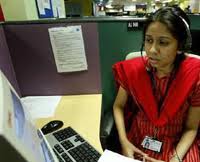
Washington, April 13: A Congressional bill that bars the US companies outsourcing call center jobs from receiving federal grants and loans now has over 100 co-sponsors, its promoter has said.
The US Call Center and Consumer Protection Act (HR 3596), introduced in the US House of Representatives by Congressman Tim Bishop now has as many as 106 lawmakers as its co-sponsors.
In a statement, Bishop hoped this would compel a hearing on the legislation in the Committee on Energy and Commerce.
The US Call Center and Consumer Protection Act, if passed by the Congress and signed into law, would require the US Department of Labor to track firms that move call center jobs overseas; the firms would then become ineligible for any direct or indirect federal loans or loan guarantees for five years.
"The provision is partially a response to the practice of companies taking millions in incentives from local taxpayers to open call centers in the US, only to off-shore their operations a short time later and leave local communities devastated and still paying the bill," Bishop said.
The bill also requires overseas call centre employees to disclose their location to US consumers and gives customers the right to be transferred to a US-based call centre upon request. "Recent reports of theft and misuse of sensitive information from British and Australian customers of Asian call centers are deeply disturbing, and it is impossible to believe that the financial and medical information of Americans has not been similarly compromised," Bishop said.
"It is clear that overseas call centers simply cannot provide the same level of security for sensitive personal data as facilities in the US, and Americans should be guaranteed the option of a domestic call center to conduct their business. Taxpayer dollars should not be supporting companies that choose protecting their bottom line over protecting their customers," the Congressman said.
"American companies should be taking all measures necessary to protect the identities and personal information of their customers, and these incidents strengthen the case to keep call centers in the US," said Congressman Michael Grimm, a former FBI agent.
"Furthermore, it is important that we do all we can to preserve American jobs and prevent them from moving overseas. This bill ensures that companies receiving taxpayer-funded federal aid or tax incentives don't use those incentives to move their call centers abroad," Grimm said.
The Communications Workers of America (CWA), who represent 150,000 call center employees across the US, have supported US Call Center and Consumer Protection Act.
"Americans are fed up with good-paying, family-supporting call center jobs here in the US being shipped overseas," said CWA chief of staff Ron Collins, who began his career in a US-based Verizon call center.
"Now, to hear that personal information is being stolen at overseas call centers just days after T-Mobile USA announces it will be closing seven call centers in the USA -- affecting 3,300 American workers - just makes your blood boil," Collins said.





Comments
Add new comment